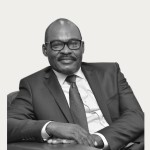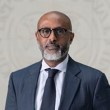Wednesday, Apr 12, 2023 | 01:00 PM - 01:30 PM
Location: Cedar Hall, HQ1-1-660
SPEAKER
 |
||
| Nicolas Kazadi Minister of Finance of the Democratic Republic of the Congo |
||
Monsieur Nicolas Kazadi est Ministre des Finances de la République Démocratique du Congo depuis le 12 avril 2021. Avant de rejoindre le Gouvernement, il était Ambassadeur itinérant du Président de la République pendant un peu plus de deux ans, soit de mars 2019 à avril 2021. Dans un contexte d’installation de nouvelles institutions de la république issues des élections, il a aidé au renforcement de la coopération multilatérale avec les institutions régionales et internationales.
Avant de regagner le pays en janvier 2019, Monsieur Nicolas KAZADI a travaillé, à partir de janvier 2002, pour la Banque Africaine de Développement comme Conseiller et Directeur exécutif par intérim, représentant cinq pays d'Afrique centrale, notamment la République Démocratique du Congo, le Cameroun, le Congo, le Burundi et la République centrafricaine et, après mi-2003, pendant 15 ans, pour le Programme des Nations Unies pour le Développement comme Conseiller économique et responsable des unités des stratégies et politiques pour la Guinée, la Côte d'Ivoire, le Madagascar et le Togo. Monsieur Nicolas KAZADI a commencé sa carrière à la Banque Centrale de la République Démocratique du Congo en 1991. Economiste de formation et banquier central de profession, il est diplômé des Universités de Brazzaville, de Reims (France) et de Paris I Panthéon-Sorbonne. Il est également ancien élève de l’Ecole Nationale d’Administration française (Promotion Averroès). Outre les langues nationales, il parle couramment le français et l’anglais.
MODERATOR
 |
||
| Abebe Aemro Selassie Director of the African Department (IMF) |
||
Abebe Aemro Selassie is the Director of the African Department, where he oversees the IMF’s operations and engagement with 45 countries across sub-Saharan Africa. Under his leadership the IMF has disbursed some $51 billion to support the post pandemic recovery and foster greener more inclusive growth. Working tirelessly alongside the region’s leaders Mr. Selassie strives to strengthen the region’s financial architecture and support Africa reaching its true potential.
Before taking up his current position in 2016, Mr. Selassie gained extensive experience in a wide-ranging career at the IMF. He held various senior positions, including Deputy Director in the African Department, Mission Chief for Portugal during the Euro Area Crisis and South Africa. He has served as the IMF’s Senior Resident Representative in Uganda and earlier in his career, he worked on the Fund’s lending programs with Turkey, Thailand, Romania and Estonia. While in the Strategy, Policy and Review Department he was deeply involved in low-income country and emerging-market programs and policy design issues. Before joining the IMF in 1994, he worked for the Government of Ethiopia as Principal Economist in the Office of the President and at the Economist Intelligence Unit in London.
SUMMARY
Key Points:
Quote:
“We want a sustainable development, and it is important for us to see that what we are bringing in the world in terms of climate challenges—the fight for climate preservation—should go along with the development of the country” Nicolas Kazadi (7:35 – 7:52)
Contributor: Fares Rawah